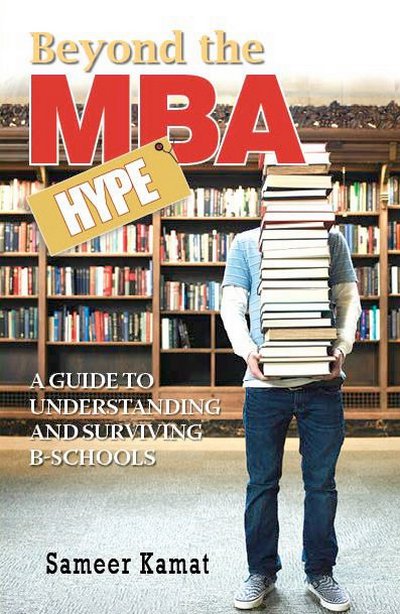
Business schools will teach you a lot of things but there are certain things that you won't be able to learn from even the best in the business. Here are seven such qualities.
It's surely a great thing to be in a business school -- you dress up in blazers, move around in air-conditioned lecture halls and make PowerPoint presentations to impress your classmates and professors.
Certainly, business schools offer you a lot of learnings and at the end of the course you do emerge somewhat smarter. But there are some things that no B-school will ever be able to teach you.
In his book Beyond the MBA Hype, Sameer Kamat lists out a dozen such qualities.
Published here with kind permission from Collins Business is an edited extract from the book that talks about 'what they can never teach you at B-school'.
You can buy the book from Rediff Books.
Sameer Kamat is the founder of MBA Crystal Ball, an admissions consulting venture. He completed his MBA from the University of Cambridge and has authored Beyond the MBA Hype, a book that seeks to bust the myths surrounding a management degree.Illustrations: Uttam Ghosh, Dominic Xavier

In the class, you will come across a whole range of personalities – the silent, the arrogant, the super-intelligent, the vociferous, the subdued, and the life-of-the-party types. For many group activities, the Type A personalities invariably end up dominating the show and assuming leadership roles. But does that automatically mean they are good leaders?
We can't accept or dispute that without getting into the details on a case-by-case basis. Leadership can be considered as an amalgamation of many traits that are listed in this section.
Consider each of them and evaluate for yourself if it is a quality that you already possess or if it is something you need to cultivate. If it is the former then the answer is clear. If it is the latter, then ask yourself if and how a business school degree can impart it to you.

...We think specialists have all the answers, just because they have been in the business for years.
Business schools are good at providing fancy tools and techniques to solve problems. At the end of the MBA programme, for every strategic or technical problem, you would be able to rattle off various frameworks and methodologies that can be used.
With so many tools under your belt, you will find it hard to acknowledge the fact that there was a world in existence before MBA programmes were started, a world with problems, and the horrifying thought that people would still tackle these problems without an MBA degree.

This could mean many things in different contexts. In management lingo, this is closely linked to planning and refers to process control. It involves monitoring the process, ensuring that events are happening as planned and taking corrective action if there is any risk of derailing.
But here we are not talking about operational or organisational control, but about the psychological aspects of control. In an organisational setting, too much of control can get you labelled as a control freak. And the other extreme can be equally damaging. A total lack of control can cause chaotic situations that may be difficult to reel in.
Corrective action ends up utilising far more resources than prevention and the proverbial stitch in time. A basic rule of thumb says too much flexibility is as bad as micro-management. But you will not come across any computer-generated simulation that will tell you how much control is good or bad.
Control could also be viewed in terms of emotions, especially negative ones such as anger and greed. Many of our personality traits are inherited or drilled into our psyche aft er years of conditioning. A shy MBA cannot transform into an extrovert at the end of the programme. An impatient student will not automatically learn the virtues of being patient. We talked about Type-A personalities. Most of them may be aware about the pitfalls of continuing to live a stressed lifestyle. However, many of their pre-wired features are so strongly ingrained in them that pure logic and reasoning aren't sufficient to turn them around.

Given unlimited resources and time, anything would seem possible. And in a classroom environment where there is little at stake, it isn't too difficult to get carried away by hypothetical discussions and overestimate the efficacies of your newly gained skills.
It is one thing to be able to provide convincing arguments and propose creative solutions to case studies. The only guys to resist and challenge your theories and solutions are your classmates and your professor... In a case study, without batting an eyelid, you can coolly recommend laying off 2,000 employees to meet the cost-cutting goals of a company and still be able to go home and sleep peacefully without having to worry about the repercussions.

Take any successful company and try to list down the top five things that make it special. And innovation will likely be one of these attributes. Innovation not just as it applies to high technology products. Innovation in the company's regular manufacturing process, quality assurance, customer interactions, human resource policies, incentive schemes, career growth opportunities. The rest of the industry calls these as best practices.
For instance, the Toyota way of working has been documented, studied and copied by many other firms. In fact, it is highly likely that one or more of your case studies will focus around Toyota's production system. But in spite of all this research by academicians and practitioners, other companies have found it difficult to match Toyota in the manufacturing area. This just means that the secret ingredient of innovation cannot be packaged in capsule format and gulped down in classroom sessions.

The school of hard knocks, as they call it. Case studies in B-schools can only provide snippets from a CEO's diary. Though they are often based on real cases and data, we have to consider the constraints of these.
How much detail can one fill into thirty odd pages of text and graphics? All the emotions that cloud the mind, the anxiety that precedes the decision-making process, the sleepless nights weighing the pros and cons of each option, the stress of meeting expectations of stakeholders and the fear of failing. An MBA sitting in the class feels none of this.

Private equity (PE) funds raise huge amounts of money so that they can invest in companies that have a substantial growth potential. PE funds are managed by very small teams and are extremely selective in their hiring...
Given the size of their investment funds and the number of companies across the globe, you would assume there is no paucity of right opportunities to invest. But despite the background work of screening companies and the number crunching, most investments do not yield the returns that were initially estimated.
The best case/worst case modelling... gets pretty complex here. But none of the MBA techniques can guarantee that the fund will make a killing on 100 per cent of its investments. At the end of the day, it is a judgment call made by the managing partners of the fund.